Ward A.W. The Cambridge History of British Foreign Policy. 1783-1919. Volume 3
Подождите немного. Документ загружается.

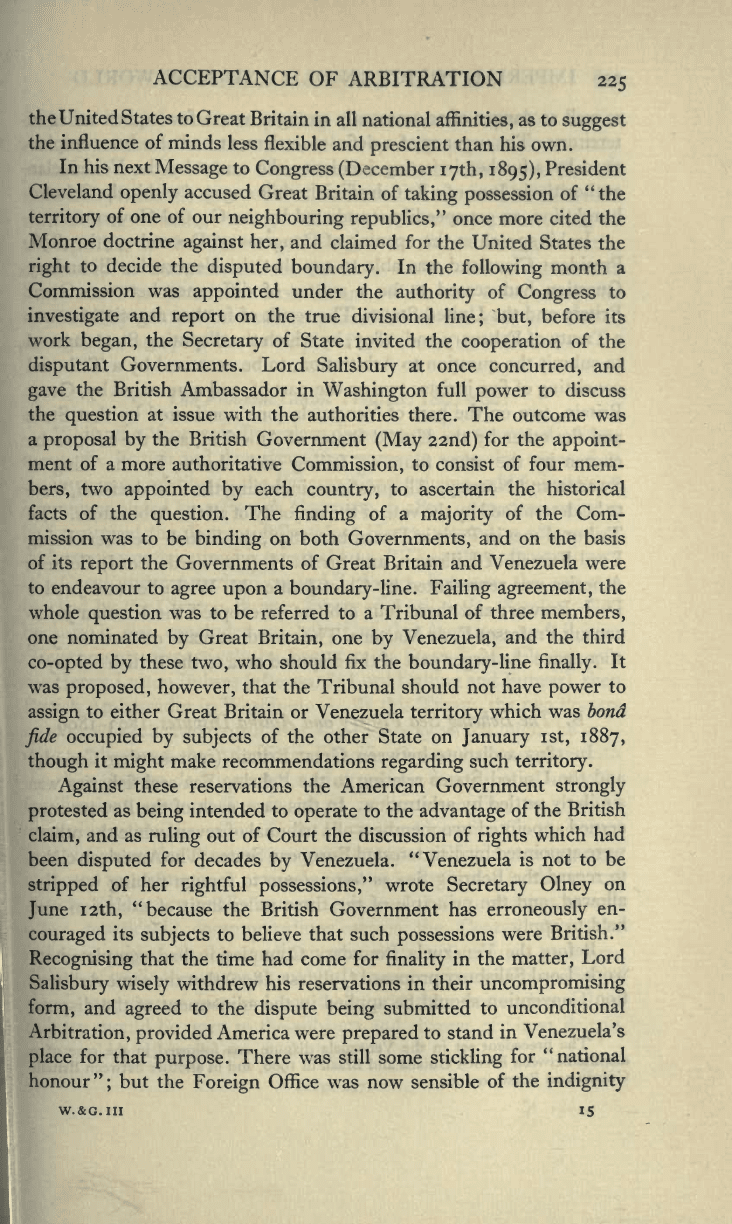
ACCEPTANCE
OF
ARBITRATION
225
the United States to
Great
Britain in
all
national
affinities,
as to
suggest
the influence of
minds
less
flexible
and
prescient
than his
own.
In his next
Message
to
Congress
(December
17th,
1895),
President
Cleveland
openly
accused
Great
Britain of
taking
possession
of "the
territory
of
one of our
neighbouring
republics,"
once
more
cited
the
Monroe
doctrine
against
her,
and
claimed
for
the United
States
the
right
to
decide
the
disputed
boundary.
In
the
following
month
a
Commission
was
appointed
under
the
authority
of
Congress
to
investigate
and
report
on
the true
divisional
line; but,
before its
work
began,
the
Secretary
of State
invited the
cooperation
of the
disputant
Governments.
Lord
Salisbury
at
once
concurred,
and
gave
the British
Ambassador in
Washington
full
power
to discuss
the
question
at
issue with the
authorities
there. The outcome was
a
proposal
by
the
British
Government
(May 22nd)
for the
appoint-
ment of a
more
authoritative
Commission,
to consist of four
mem-
bers,
two
appointed
by
each
country,
to ascertain
the historical
facts of the
question.
The
finding
of
a
majority
of the Com-
mission was
to be
binding
on both
Governments,
and
on the basis
of its
report
the
Governments of
Great
Britain and Venezuela were
to
endeavour to
agree upon
a
boundary-line.
Failing agreement,
the
whole
question
was to
be
referred to
a Tribunal
of three
members,
one nominated
by
Great
Britain,
one
by
Venezuela,
and the
third
co-opted
by
these
two,
who
should
fix
the
boundary-line
finally.
It
was
proposed,
however,
that
the
Tribunal should
not
have
power
to
assign
to
either Great Britain or
Venezuela
territory
which
was
bond
fide occupied
by subjects
of the other
State
on
January
1st,
1887,
though
it
might
make recommendations
regarding
such
territory.
Against
these reservations the American Government
strongly
protested
as
being
intended
to
operate
to
the
advantage
of the
British
claim,
and
as
ruling
out of Court the discussion
of
rights
which
had
been
disputed
for
decades
by
Venezuela.
"
Venezuela
is not
to be
stripped
of
her
rightful possessions,"
wrote
Secretary
Olney
on
June
1
2th,
"
because
the
British Government has
erroneously
en-
couraged
its
subjects
to
believe
that
such
possessions
were
British."
Recognising
that
the time
had come for
finality
in
the
matter,
Lord
Salisbury
wisely
withdrew
his reservations in their
uncompromising
form,
and
agreed
to
the
dispute being
submitted
to
unconditional
Arbitration,
provided
America were
prepared
to
stand
in
Venezuela's
place
for
that
purpose.
There
was still
some
stickling
for
"national
honour
"
;
but
the
Foreign
Office was now sensible
of
the
indignity
W.&G.III
15
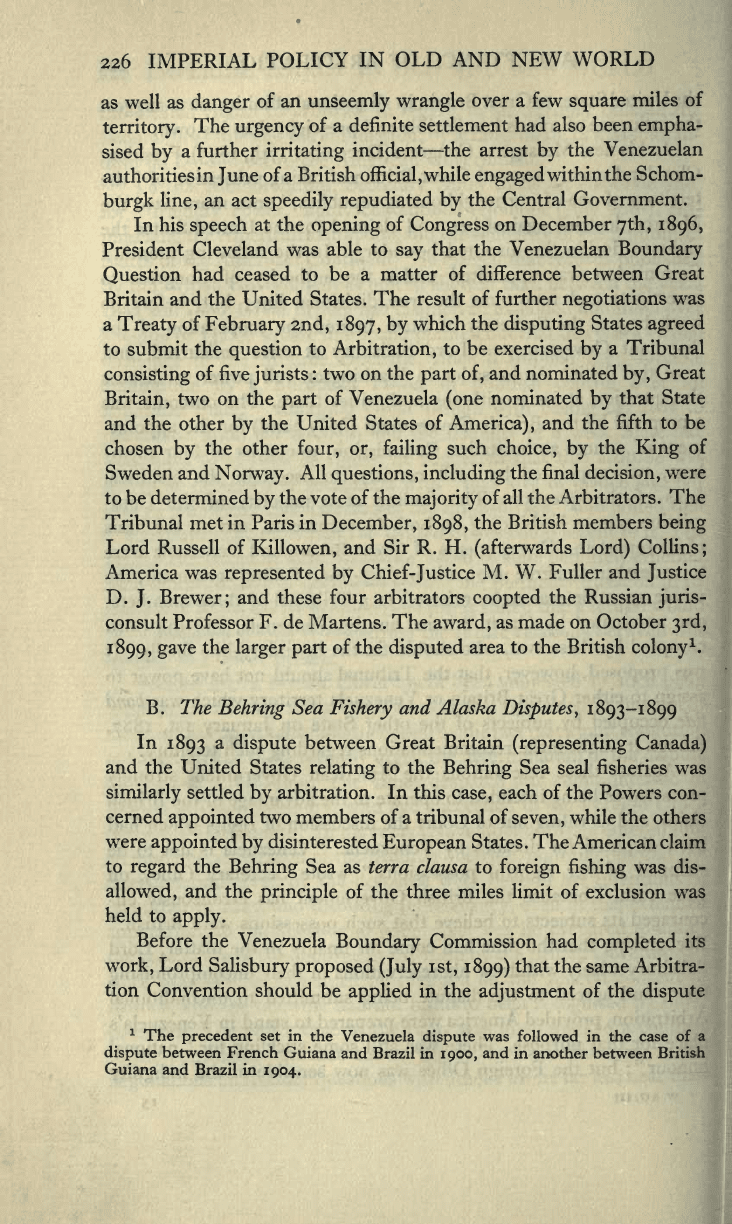
226
IMPERIAL
POLICY
IN OLD
AND
NEW
WORLD
as well
as
danger
of
an
unseemly
wrangle
over a
few
square
miles
of
territory.
The
urgency
of a
definite
settlement
had also
been
empha-
sised
by
a
further
irritating
incident
—
the arrest
by
the
Venezuelan
authorities
in
June
of a British
official,
while
engaged
withinthe
Schom-
burgk
line,
an
act
speedily
repudiated by
the
Central
Government.
In
his
speech
at the
opening
of
Congress
on December
7th,
1896,
President
Cleveland
was able
to
say
that the Venezuelan
Boundary
Question
had ceased
to be a matter of difference
between
Great
Britain
and the United States.
The result of further
negotiations
was
a
Treaty
of
February
2nd,
1897,
by
which the
disputing
States
agreed
to submit the
question
to
Arbitration,
to
be exercised
by
a Tribunal
consisting
of
five
jurists
:
two
on
the
part
of,
and
nominated
by,
Great
Britain,
two on
the
part
of
Venezuela
(one
nominated
by
that State
and
the other
by
the
United States of
America),
and the
fifth
to be
chosen
by
the other
four,
or,
failing
such
choice,
by
the
King
of
Sweden and
Norway.
All
questions,
including
the
final
decision,
were
to be
determined
by
the vote
of the
majority
of all the
Arbitrators.
The
Tribunal
met
in Paris in
December,
1898,
the
British members
being
Lord Russell of
Killowen,
and
Sir R. H.
(afterwards Lord)
Collins;
America was
represented
by
Chief-
Justice
M.
W. Fuller
and
Justice
D.
J.
Brewer;
and these four arbitrators
coopted
the
Russian
juris-
consult Professor
F.
de Martens. The
award,
as made on October
3rd,
1899, gave
the
larger part
of
the
disputed
area
to
the British
colony
1
.
B. The
Behring
Sea
Fishery
and Alaska
Disputes,
1
893-1 899
In
1893
a
dispute
between Great Britain
(representing Canada)
and
the United States
relating
to
the
Behring
Sea seal fisheries was
similarly
settled
by
arbitration.
In
this
case,
each
of the
Powers
con-
cerned
appointed
two
members
of a tribunal
of
seven,
while the others
were
appointed
by
disinterested
European
States. The American claim
to
regard
the
Behring
Sea
as
terra
clausa
to
foreign
fishing
was
dis-
allowed,
and
the
principle
of
the three
miles limit of
exclusion
was
held to
apply.
Before the
Venezuela
Boundary
Commission
had
completed
its
work,
Lord
Salisbury proposed
(July
1st,
1899)
that
the same
Arbitra-
tion
Convention should
be
applied
in the
adjustment
of
the
dispute
1
The
precedent
set
in
the
Venezuela
dispute
was
followed
in the case
of
a
dispute
between
French
Guiana
and
Brazil in
1900,
and
in another between
British
Guiana and Brazil in
1904.
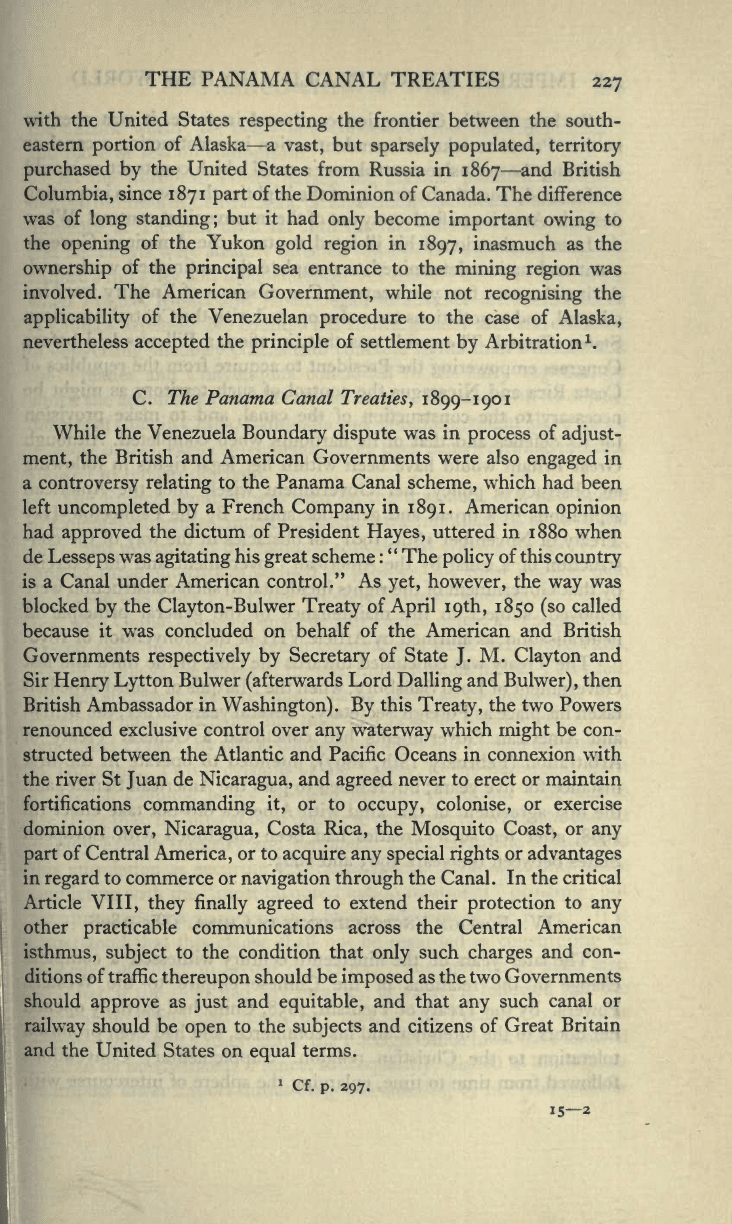
THE
PANAMA
CANAL TREATIES
227
with
the United
States
respecting
the frontier between the south-
eastern
portion
of
Alaska
—
a
vast,
but
sparsely
populated,
territory
purchased
by
the
United
States
from
Russia
in
1867
—
and British
Columbia,
since
1871 part
of
the
Dominion of Canada.
The difference
was of
long standing;
but
it had
only
become
important
owing
to
the
opening
of the Yukon
gold
region
in
1897,
inasmuch
as
the
ownership
of the
principal
sea
entrance
to
the
mining region
was
involved. The American
Government,
while not
recognising
the
applicability
of
the Venezuelan
procedure
to the
case of
Alaska,
nevertheless
accepted
the
principle
of
settlement
by
Arbitration
1
.
C. The Panama
Canal
Treaties
,
1
899-1 901
While the Venezuela
Boundary dispute
was in
process
of
adjust-
ment,
the
British and American
Governments were also
engaged
in
a
controversy
relating
to the Panama Canal
scheme,
which had
been
left
uncompleted
by
a French
Company
in
1891.
American
opinion
had
approved
the
dictum of President
Hayes,
uttered
in
1880 when
de
Lesseps
was
agitating
his
great
scheme :
"
The
policy
of
this
country
is a
Canal under American control." As
yet,
however,
the
way
was
blocked
by
the
Clayton-Bulwer Treaty
of
April
19th, 1850
(so
called
because
it was concluded on behalf of the American and British
Governments
respectively by Secretary
of State
J.
M.
Clayton
and
Sir
Henry Lytton
Bulwer
(afterwards
Lord
Dalling
and
Bulwer),
then
British
Ambassador in
Washington). By
this
Treaty,
the two Powers
renounced exclusive
control over
any waterway
which
might
be con-
structed between
the Atlantic
and
Pacific Oceans in connexion
with
the
river
St
Juan
de
Nicaragua,
and
agreed
never to erect or
maintain
fortifications
commanding
it,
or to
occupy,
colonise,
or
exercise
dominion
over,
Nicaragua,
Costa
Rica,
the
Mosquito
Coast,
or
any
part
of Central
America,
or
to
acquire any special
rights
or
advantages
in
regard
to
commerce or
navigation through
the Canal.
In the
critical
Article
VIII,
they finally agreed
to extend
their
protection
to
any
other
practicable
communications across
the
Central
American
isthmus,
subject
to the condition
that
only
such
charges
and
con-
ditions of traffic
thereupon
should be
imposed
as
the
two
Governments
should
approve
as
just
and
equitable,
and
that
any
such
canal
or
railway
should
be
open
to the
subjects
and
citizens
of
Great
Britain
and
the
United States on
equal
terms.
1
Cf.
p. 297.
15—2

228
IMPERIAL
POLICY
IN OLD
AND NEW WORLD
So
long
as
this Convention
continued in
force,
it was
open
to
neither
Power
to
take
independent
action in
constructing
a canal
or
obtaining
the exclusive
control
over
a canal
which
construction would
confer
;
and,
from the
beginning
of the
'eighties
there
was
an
increasing
desire
in America to find a
way
out of
the inconvenient
contract. When
de
Lesseps
abandoned
his
ill-fated
venture,
the American
Govern-
ment and nation determined
to
complete
the unfinished
work;
and,
during
the next few
years
several Commissions of
Enquiry
were
in-
stituted,
and
negotiations
were
also
opened
with the Central
American
States affected.
The
result
was
that,
in
1899,
a
Bill
was
laid before
Congress empowering
the President
to
acquire
from
the
republics
of
Costa Rica
and
Nicaragua
the control of such
territory
as
might
be
necessary
to the construction
of the
canal,
and to make
provision
for its
defence
and that of
its
harbours
when
completed.
Although
Great Britain would have been
within her
legal
rights
in
following
an
obstructive
policy,
her Government
wisely
met
the
American
aspirations
in a broad and
generous
spirit. By
the
Pauncefote-Hay
Treaty
of November
18th,
1901,
all obstacles
in the
way
of the con-
struction
of a canal
by
the American
Government
and the
exercise
by
that Government
of
the
rights
incidental
to such construction were
removed,
subject
to
the maintenance
of the
general principle
of
neutralisation,
as affirmed
by
Article
VIII of the Convention
of
1850.
The
Treaty
was concluded
towards
the
close
of the third and last
Government of Lord
Salisbury,
when
the
Marquis
of Lansdowne had
taken
his
place
as
Foreign
Secretary.
Several
years
earlier,
the British
and American Governments
had concluded
a General
Treaty
of
Arbitration
(February
18th,
1897),
intended
to
operate
in
the
first
instance
for
five
years
;
but it failed to
pass
the American
Senate,
and
the first
agreement
of this
kind with America
did not
take
effect
till
1908,
after ten
such Treaties had
been concluded
with
European
States between the
years
1903
and
1905.
IV.
Foreign Encroachments
in
China,
1
885-1 898
The
later
years
of
the
nineteenth
century
witnessed
a
complete
change
in the relations
of the Chinese
empire
to the Western
Powers.
By
the
Treaty
of
Tientsin,
1858,
China
had
partially
opened
her
doors
to
the
foreigner
and his
commerce,
and had even
promised
toleration
to
the
Christian
religion.
Supplementary
Conventions
followed
from
time to
time,
enlarging
the
sphere
of intercourse
with
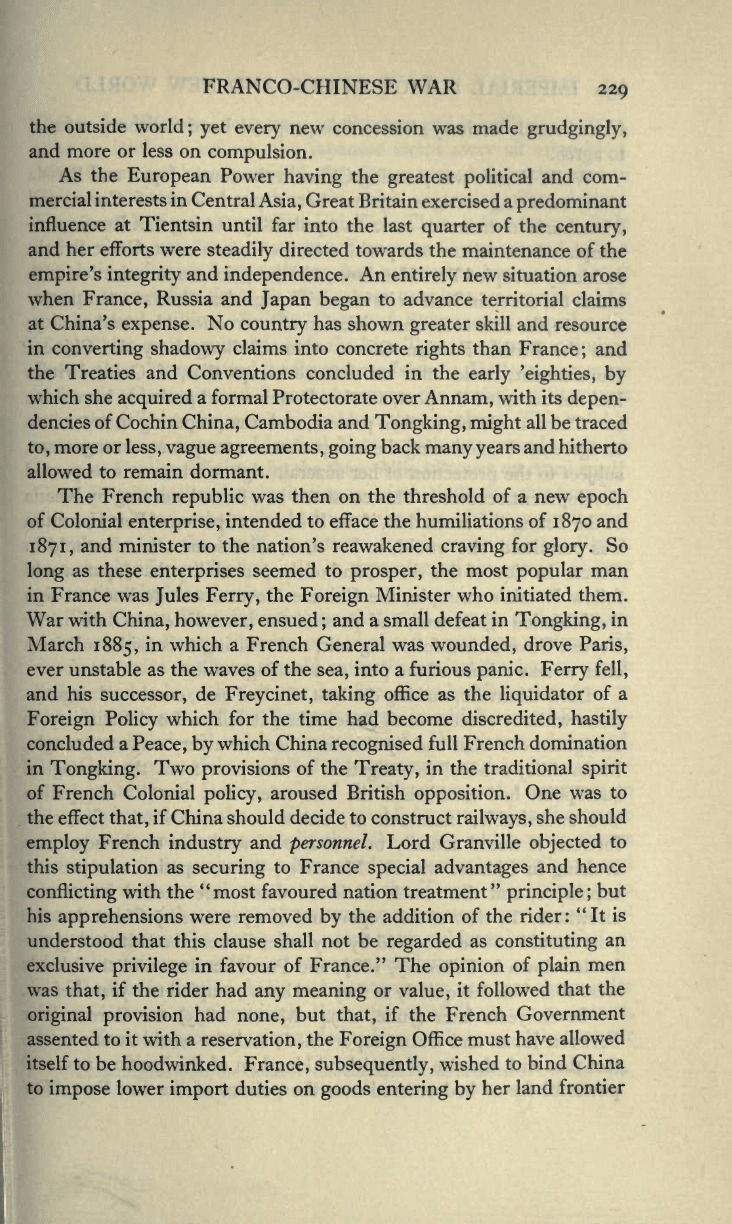
FRANCO-CHINESE WAR
229
the
outside
world;
yet
every
new
concession was made
grudgingly,
and
more or less
on
compulsion.
As the
European
Power
having
the
greatest political
and com-
mercial
interests
in
Central
Asia,
Great Britain
exercised
a
predominant
influence
at
Tientsin
until far
into the last
quarter
of the
century,
and her efforts were
steadily
directed towards
the
maintenance of the
empire's
integrity
and
independence.
An
entirely
new situation arose
when
France,
Russia
and
Japan
began
to
advance
territorial claims
at China's
expense.
No
country
has
shown
greater
skill
and
resource
in
converting shadowy
claims into
concrete
rights
than
France
;
and
the Treaties
and
Conventions concluded in the
early 'eighties,
by
which she
acquired
a
formal
Protectorate over
Annam,
with its
depen-
dencies of Cochin
China,
Cambodia and
Tongking, might
all
be traced
to,
more or
less,
vague agreements, going
back
many years
and
hitherto
allowed to remain dormant.
The French
republic
was
then on
the threshold
of a
new
epoch
of Colonial
enterprise,
intended to efface the humiliations of
1870
and
1
87
1,
and
minister
to the nation's reawakened
craving
for
glory.
So
long
as
these
enterprises
seemed to
prosper,
the
most
popular
man
in
France was
Jules
Ferry,
the
Foreign
Minister
who initiated them.
War
with
China, however,
ensued
;
and a small defeat
in
Tongking,
in
March
1885,
in which a French General was
wounded,
drove
Paris,
ever unstable as the
waves
of the
sea,
into
a
furious
panic. Ferry
fell,
and his
successor,
de
Freycinet,
taking
office as the
liquidator
of
a
Foreign Policy
which
for the
time had become
discredited,
hastily
concluded
a
Peace,
by
which China
recognised
full French
domination
in
Tongking.
Two
provisions
of
the
Treaty,
in the
traditional
spirit
of French Colonial
policy,
aroused British
opposition.
One
was
to
the effect
that,
if
China should decide to construct
railways,
she
should
employ
French
industry
and
personnel.
Lord
Granville
objected
to
this
stipulation
as
securing
to France
special advantages
and hence
conflicting
with the "most favoured nation treatment"
principle;
but
his
apprehensions
were
removed
by
the
addition
of the
rider:
"It is
understood that this
clause
shall not be
regarded
as
constituting
an
exclusive
privilege
in
favour
of
France."
The
opinion
of
plain
men
was
that,
if
the rider had
any
meaning
or
value,
it followed
that
the
original
provision
had
none,
but
that,
if
the
French
Government
assented to
it
with a
reservation,
the
Foreign
Office
must
have
allowed
itself
to be
hoodwinked.
France,
subsequently,
wished
to
bind
China
to
impose
lower
import
duties on
goods
entering
by
her
land
frontier

2
3
o IMPERIAL
POLICY
IN OLD
AND
NEW WORLD
from French
territory;
but to this
proposal
Lord
Salisbury
refused
to
agree.
While
France was
pressing
China
in
the
south,
Japan
and Russia
were
maturing designs
against
her
dependencies
of Corea
and
Manchuria
in
the north-east.
In
April,
1885,
fearing
that Russia
con-
templated
the seizure of
a
position
on
the Corean
coast,
Great
Britain
suddenly occupied
Port
Hamilton,
without
prior
communication
with
either the suzerain State or
its
vassal.
Though
described
as a
temporary
measure,
the act
was
an
open
violation of
international
law
and
comity
;
and the British
Foreign
Office,
when
challenged
by
the
Chinese
Government,
could offer no defence
except
that,
if
Great
Britain
had not
occupied
the
port,
another Power would
probably
have
done
so.
China
made
no further
protest,
and was
preparing
to enter
into
an
agreement
sanctioning
the
occupation
as
a
temporary arrangement,
subject
to
the
protection
of her suzerain
rights,
when an
unexpected
development
occurred.
This
consisted
in
a
formal
warning by
Russia
to the
Tsung-li-Yamen
that,
if
the British
occupation
of
Port Hamilton
was
permitted,
she
would,
in her
turn,
seize some
other
foothold
in
Corea. In
view of this
threat,
and of the
probability
that
Japan
would
follow
Russia's
example,
the
Chinese
Government declined to
sign
the
intended
agreement,
and
pressed
for immediate
evacuation,
the
Corean
Government
following
suit,
and
refusing
to consider a
British
offer to
take
a
lease
of
the
port
as a
coaling-station.
Lord
Granville,
making
the best of a bad
case,
continued
negotia-
tions without
success
until
June,
when
it
fell
to Lord
Salisbury
to
straighten
out
what
had
by
this time become
a
very
awkward
tangle.
Meanwhile,
a naval
investigation
of the
port
from
the
strategical
standpoint
had
established the convenient fact that
its
occupation
was
undesirable,
inasmuch
as,
unless
converted
into a first-class
fortress,
it
would
actually
be
a
source
of weakness to the
squadron
cruising
in Chinese
waters.
Moreover,
the
occupation
was
proving
expensive,
and the
vessels stationed there were
needed for service
elsewhere.
In
view of this
report
and of
a
promise by
China
that the
port
should not
be
occupied
by any
other
Power,
the
British
flag
was
hauled
down in
February,
1887,
and Port
Hamilton and the
islands
were
abandoned
as
quietly
as
they
had been
occupied
two
years
before.
Seven
years
later
(June,
1894
—
March,
1895)
the Corean
War
between
Japan
and
China
supervened;
and the world awoke
to
the
fact that
with
the rise of
the
island
kingdom
of the Pacific a new
and
powerful
factor had
entered
into the
politics
of
the
Far East.
For
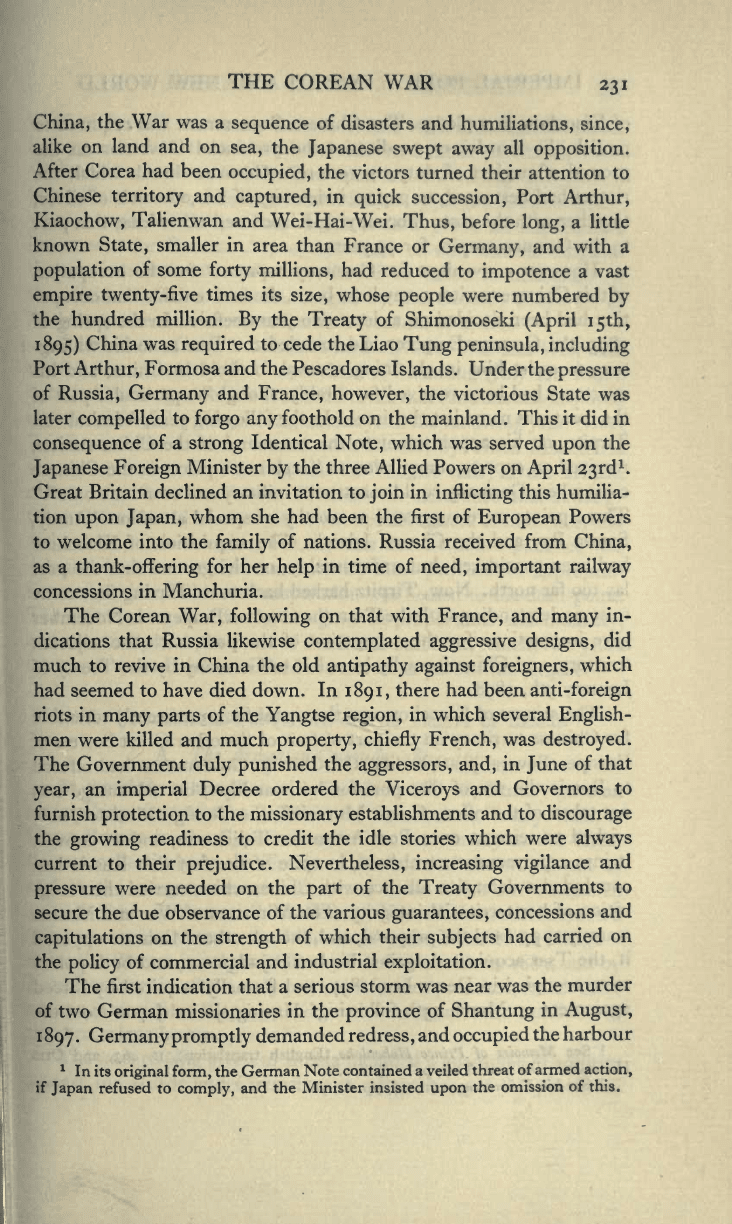
THE
COREAN WAR
231
China,
the
War
was a
sequence
of
disasters and
humiliations, since,
alike
on
land
and
on
sea,
the
Japanese
swept
away
all
opposition.
After Corea
had
been
occupied,
the victors
turned their attention to
Chinese
territory
and
captured,
in
quick
succession,
Port
Arthur,
Kiaochow,
Talienwan
and
Wei-Hai-Wei.
Thus,
before
long,
a little
known
State,
smaller in
area than
France or
Germany,
and with
a
population
of
some
forty
millions,
had
reduced to
impotence
a vast
empire
twenty-five
times its
size,
whose
people
were
numbered
by
the
hundred
million.
By
the
Treaty
of
Shimonoseki
(April
15th,
1895)
China
was
required
to
cede the Liao
Tung peninsula,
including
Port
Arthur,
Formosa
and the
Pescadores
Islands.
Under the
pressure
of
Russia,
Germany
and
France,
however,
the victorious State was
later
compelled
to
forgo any
foothold
on
the
mainland.
This it
did
in
consequence
of a
strong
Identical
Note,
which
was
served
upon
the
Japanese Foreign
Minister
by
the
three Allied Powers on
April 23rd
1
.
Great
Britain
declined
an
invitation to
join
in
inflicting
this humilia-
tion
upon Japan,
whom she had been the
first
of
European
Powers
to
welcome
into
the
family
of nations.
Russia
received from
China,
as a
thank-offering
for her
help
in
time of
need,
important railway
concessions
in
Manchuria.
The
Corean
War,
following
on
that
with
France,
and
many
in-
dications that Russia likewise
contemplated aggressive
designs,
did
much to
revive
in China
the
old
antipathy against foreigners,
which
had
seemed
to have died down.
In
1891,
there
had
been
anti-foreign
riots
in
many
parts
of the
Yangtse
region,
in
which several
English-
men
were
killed and much
property,
chiefly
French,
was
destroyed.
The Government
duly
punished
the
aggressors,
and,
in
June
of
that
year,
an
imperial
Decree
ordered
the
Viceroys
and Governors
to
furnish
protection
to
the
missionary
establishments
and to
discourage
the
growing
readiness
to
credit
the idle
stories which
were
always
current
to their
prejudice.
Nevertheless,
increasing vigilance
and
pressure
were needed
on the
part
of the
Treaty
Governments
to
secure the
due observance
of the various
guarantees,
concessions
and
capitulations
on the
strength
of
which their
subjects
had
carried
on
the
policy
of
commercial
and
industrial
exploitation.
The first indication that
a serious
storm was near
was
the murder
of
two
German missionaries
in the
province
of
Shantung
in
August,
1
897
.
Germanypromptly
demanded
redress
,
and
occupied
the
harbour
1
In
its
original form,
the
German
Note
contained
a
veiled
threat
of armed
action,
if
Japan
refused to
comply,
and the
Minister insisted
upon
the
omission
of this.
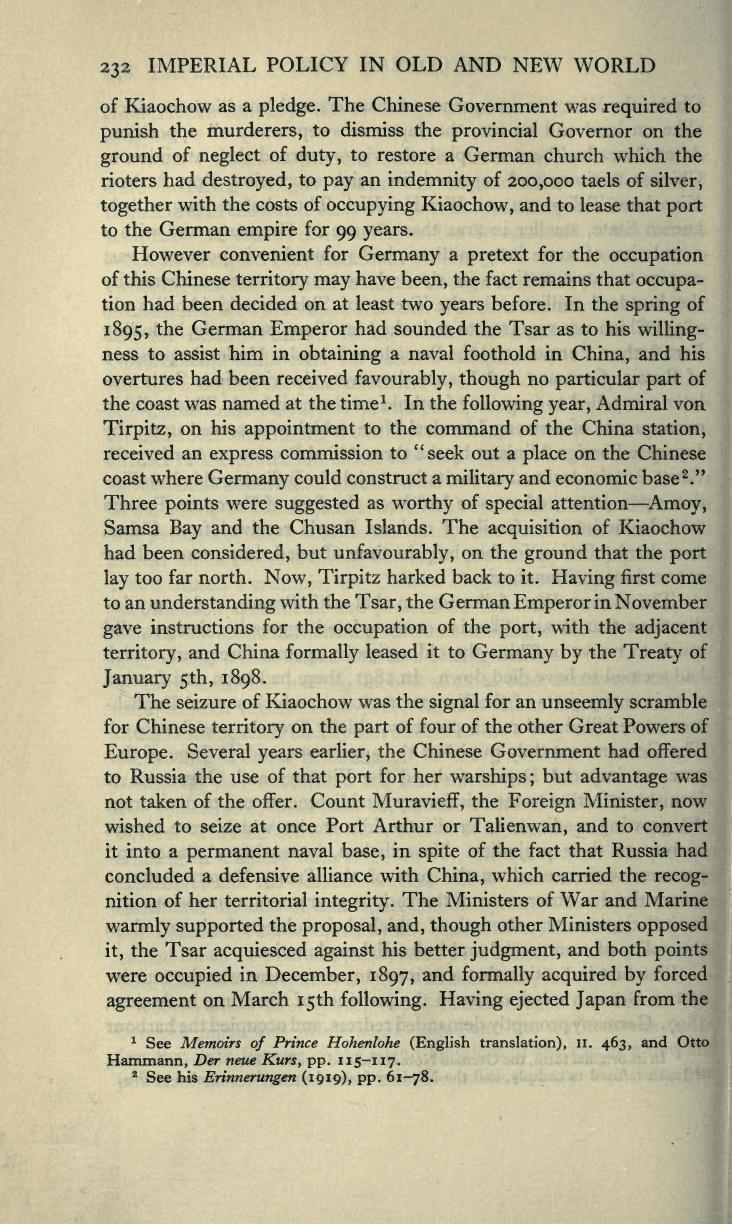
232
IMPERIAL
POLICY
IN
OLD
AND
NEW
WORLD
of Kiaochow
as
a
pledge.
The
Chinese
Government was
required
to
punish
the
murderers,
to dismiss
the
provincial
Governor on the
ground
of
neglect
of
duty,
to
restore a
German church
which the
rioters
had
destroyed,
to
pay
an
indemnity
of
200,000
taels of
silver,
together
with the costs
of
occupying
Kiaochow,
and to
lease
that
port
to the
German
empire
for
99
years.
However convenient
for
Germany
a
pretext
for
the
occupation
of
this Chinese
territory may
have
been,
the fact
remains
that
occupa-
tion had been
decided on
at
least two
years
before. In
the
spring
of
1895,
the German
Emperor
had
sounded the Tsar
as to his
willing-
ness to assist
him in
obtaining
a naval
foothold
in
China,
and his
overtures
had
been
received
favourably,
though
no
particular
part
of
the
coast was named
at the time
1
.
In
the
following
year,
Admiral
von
Tirpitz,
on
his
appointment
to
the command of
the China
station,
received
an
express
commission to
"seek out a
place
on
the Chinese
coast where
Germany
could construct
a
military
and
economic base
2
."
Three
points
were
suggested
as
worthy
of
special
attention
—
Amoy,
Samsa
Bay
and the Chusan
Islands.
The
acquisition
of
Kiaochow
had
been
considered,
but
unfavourably,
on the
ground
that the
port
lay
too
far north.
Now,
Tirpitz
harked back to it.
Having
first come
to
an
understanding
with the
Tsar,
the
German
Emperor
in
November
gave
instructions
for the
occupation
of the
port,
with the
adjacent
territory,
and
China
formally
leased
it
to
Germany by
the
Treaty
of
January
5th,
1898.
The
seizure
of Kiaochow was the
signal
for an
unseemly
scramble
for Chinese
territory
on the
part
of
four
of the
other Great
Powers
of
Europe.
Several
years
earlier,
the Chinese
Government
had
offered
to
Russia the
use of
that
port
for
her
warships
;
but
advantage
was
not taken
of the offer.
Count
Muravieff,
the
Foreign
Minister,
now
wished
to
seize
at once
Port Arthur or
Tali
en
wan,
and to convert
it
into
a
permanent
naval
base,
in
spite
of the fact
that
Russia
had
concluded
a
defensive
alliance with
China,
which carried
the
recog-
nition of her territorial
integrity.
The
Ministers of War and Marine
warmly
supported
the
proposal,
and,
though
other Ministers
opposed
it,
the
Tsar
acquiesced against
his better
judgment,
and
both
points
were
occupied
in
December,
1897,
and
formally
acquired by
forced
agreement
on
March
15th following.
Having
ejected Japan
from
the
1
See
Memoirs
of
Prince Hohenlohe
(English
translation),
II.
463,
and Otto
Hammann,
Der
neue
Kurs,
pp.
11
5-1
17.
2
See his
Erinnerungen
(19 19),
pp.
61-78.
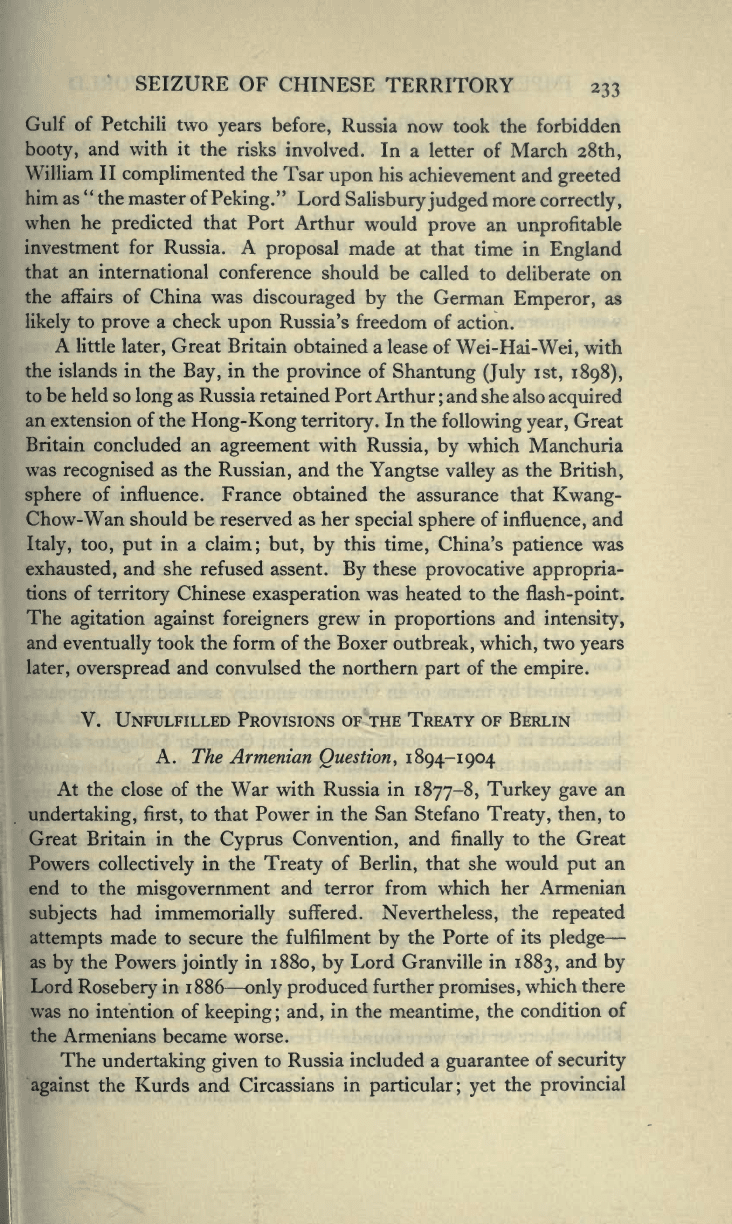
SEIZURE
OF
CHINESE
TERRITORY
233
Gulf of Petchili
two
years
before,
Russia now
took the
forbidden
booty,
and with it
the risks
involved. In
a
letter of March
28th,
William
II
complimented
the
Tsar
upon
his
achievement and
greeted
him as
"
the master
of
Peking."
Lord
Salisbury
judged
more
correctly,
when he
predicted
that
Port
Arthur
would
prove
an
unprofitable
investment for
Russia.
A
proposal
made at
that
time
in
England
that an international
conference should
be
called
to
deliberate
on
the
affairs
of China was
discouraged
by
the
German
Emperor,
as
likely
to
prove
a check
upon
Russia's
freedom
of
action.
A
little
later,
Great
Britain
obtained a
lease of
Wei-Hai-Wei,
with
the islands in the
Bay,
in
the
province
of
Shantung
(July
1st,
1898),
to be held so
long
as Russia
retained Port
Arthur
;
and she also
acquired
an extension of the
Hong-Kong
territory.
In the
following year,
Great
Britain concluded an
agreement
with
Russia,
by
which Manchuria
was
recognised
as the
Russian,
and
the
Yangtse
valley
as the
British,
sphere
of
influence.
France obtained the
assurance
that
Kwang-
Chow-Wan should be reserved as her
special sphere
of
influence,
and
Italy,
too,
put
in
a
claim;
but,
by
this
time,
China's
patience
was
exhausted,
and
she refused assent.
By
these
provocative appropria-
tions of
territory
Chinese
exasperation
was heated to the
flash-point.
The
agitation
against foreigners grew
in
proportions
and
intensity,
and
eventually
took the form of the
Boxer
outbreak, which,
two
years
later,
overspread
and
convulsed the northern
part
of the
empire.
V.
Unfulfilled Provisions
of
the
Treaty of Berlin
A. The
Armenian
Question,
1
894-1
904
At
the close of the War
with
Russia
in
1877-8,
Turkey gave
an
undertaking,
first,
to that Power
in
the
San
Stefano
Treaty,
then,
to
Great Britain in
the
Cyprus
Convention,
and
finally
to the Great
Powers
collectively
in
the
Treaty
of
Berlin,
that she would
put
an
end
to the
misgovernment
and terror from which her
Armenian
subjects
had
immemorially
suffered.
Nevertheless,
the
repeated
attempts
made to
secure
the
fulfilment
by
the Porte
of
its
pledge
—
as
by
the
Powers
jointly
in
1880,
by
Lord
Granville
in
1883,
and
by
Lord
Rosebery
in
1886
—
only
produced
further
promises,
which there
was
no intention of
keeping;
and,
in the
meantime,
the condition
of
the
Armenians
became
worse.
The
undertaking given
to
Russia included a
guarantee
of
security
against
the Kurds and Circassians
in
particular;
yet
the
provincial
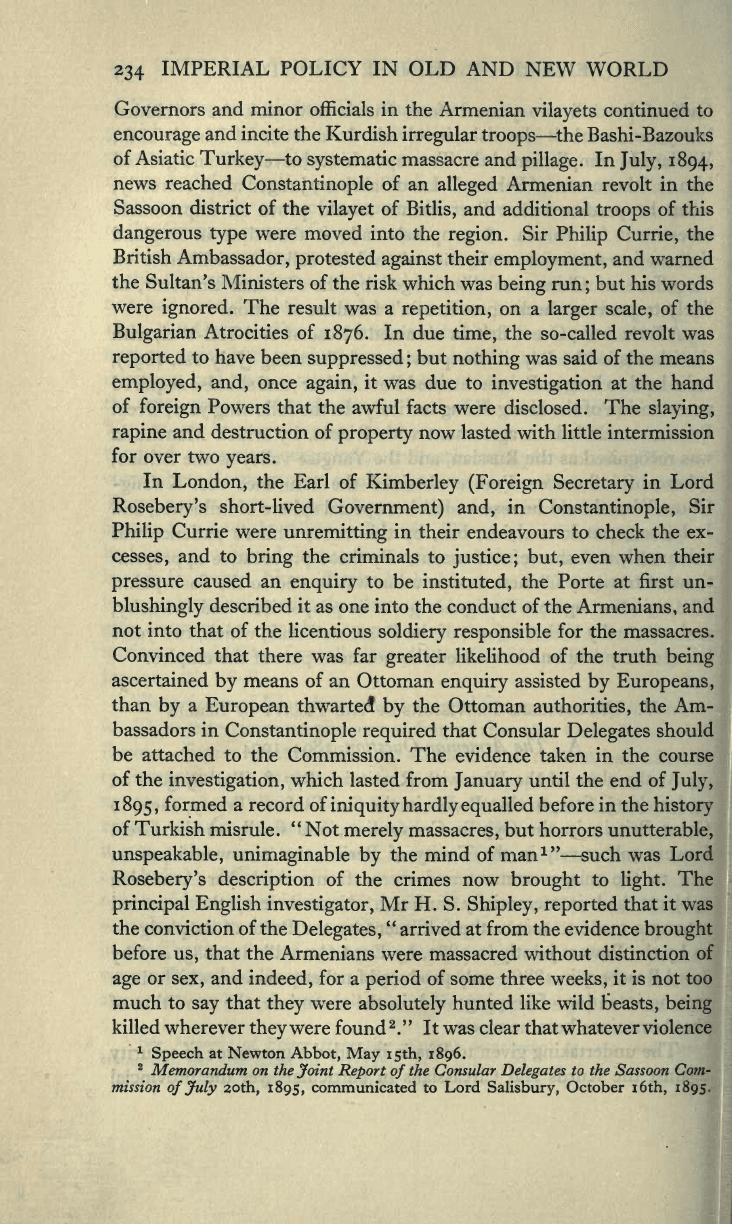
234
IMPERIAL POLICY IN
OLD AND
NEW WORLD
Governors and
minor
officials in
the
Armenian
vilayets
continued
to
encourage
and incite
the Kurdish
irregular troops
—
the
Bashi-Bazouks
of Asiatic
Turkey
—
to
systematic
massacre and
pillage.
In
July,
1894,
news reached
Constantinople
of
an
alleged
Armenian revolt
in
the
Sassoon
district of
the
vilayet
of
Bitlis,
and
additional
troops
of
this
dangerous
type
were
moved
into the
region.
Sir
Philip
Currie,
the
British
Ambassador,
protested
against
their
employment,
and warned
the
Sultan's
Ministers of
the
risk
which
was
being
run
;
but his words
were
ignored.
The result
was a
repetition,
on a
larger
scale,
of the
Bulgarian
Atrocities of
1876.
In
due
time,
the so-called revolt was
reported
to
have
been
suppressed
;
but
nothing
was said of the means
employed,
and,
once
again,
it
was
due to
investigation
at the
hand
of
foreign
Powers that
the
awful facts
were disclosed.
The
slaying,
rapine
and
destruction
of
property
now lasted with little intermission
for
over two
years.
In
London,
the
Earl
of
Kimberley (Foreign Secretary
in Lord
Rosebery's
short-lived
Government)
and,
in
Constantinople,
Sir
Philip
Currie
were
unremitting
in
their
endeavours
to check the
ex-
cesses,
and
to
bring
the criminals to
justice;
but,
even when
their
pressure
caused an
enquiry
to be
instituted,
the Porte
at first un-
blushingly
described
it
as
one into the conduct of the
Armenians,
and
not
into that of
the
licentious
soldiery responsible
for
the
massacres.
Convinced
that
there was
far
greater
likelihood
of
the
truth
being
ascertained
by
means of an
Ottoman
enquiry
assisted
by
Europeans,
than
by
a
European
thwarted
by
the Ottoman
authorities,
the
Am-
bassadors in
Constantinople
required
that
Consular
Delegates
should
be
attached to
the
Commission. The
evidence
taken
in
the
course
of
the
investigation,
which
lasted
from
January
until the end of
July,
1895,
formed a
record of
iniquity
hardly equalled
before in
the
history
of
Turkish
misrule.
"
Not
merely
massacres,
but
horrors
unutterable,
unspeakable,
unimaginable
by
the
mind
of
man
1
"
—
such
was
Lord
Rosebery's description
of
the crimes now
brought
to
light.
The
principal
English
investigator,
Mr
H. S.
Shipley,
reported
that
it
was
the conviction
of
the
Delegates,
"
arrived
at from
the
evidence
brought
before
us,
that
the
Armenians
were
massacred without
distinction
of
age
or
sex,
and
indeed,
for
a
period
of some three
weeks,
it is
not
too
much
to
say
that
they
were
absolutely
hunted like wild
beasts,
being
killed wherever
they
were
found
2
."
It
was clear that whatever
violence
1
Speech
at Newton
Abbot,
May 15th,
1896.
2
Memorandum on the
Joint
Report of
the
Consular
Delegates
to the Sassoon
Com-
mission
of
July
20th, 1895,
communicated to
Lord
Salisbury,
October
16th, 1895.
